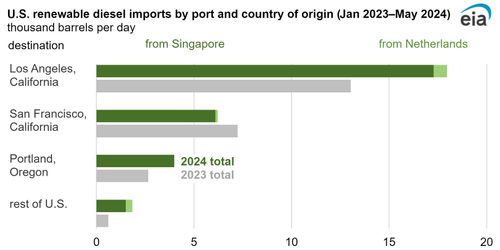
In the first five months of 2024, U.S. imports of renewable diesel averaged 30,000 barrels per day (b/d), approaching the monthly record set in May 2023. Most of the imports (94%) were destined for the U.S. West Coast, where most of the country's renewable diesel is consumed. All U.S. imports came from Neste’s plants in Singapore and Rotterdam.
Renewable diesel is a transportation and heating fuel that is chemically equivalent to petroleum-based distillate fuel but is produced using fats, oils, or greases rather than petroleum. Because California, Oregon, and Washington are the only states with active clean fuel programs that incentivize the consumption of renewable diesel beyond the incentives provided by federal policies, renewable diesel is primarily consumed on the West Coast.
The United States imported 29% more renewable diesel during the first five months of 2024 than in the same period last year. The increase in imports was likely driven by increased:
Production capacity at Neste’s Singapore plant following its expansion in mid-2023
Renewable diesel storage capacity at Vopak’s terminal in Los Angeles, California
So far in 2024, 18,000 b/d of the 30,000 b/d of imported renewable diesel have gone to Los Angeles, an increase from 2023’s annual average of 13,000 b/d, according to our company-level import data. The increase in terminal capacity in Los Angeles has likely underpinned the growth in imports to that port in 2024.
Renewable diesel imports arriving in San Francisco, California, have decreased slightly, while imports increased slightly in 2024 to Portland, Oregon; Atlanta, Georgia; and Perth Amboy, New Jersey. Neste’s Singapore plant has supplied 96% of U.S. renewable diesel imports so far in 2024, and its Rotterdam plant has supplied the remaining 4%. The ratio was similar in 2023, but Neste’s Finland plant also supplied some renewable diesel last year.
Imports of biomass-based diesel—a category that includes both renewable diesel and biodiesel—have made up a larger-than-normal portion of U.S. consumption. In the first five months of 2024, imported biomass-based diesel supplied about 20% of U.S. biomass-based diesel consumption, compared with about 15% in 2023 and 10% in 2022.
Although we forecast that more biodiesel and renewable diesel will be imported in 2024 than in previous years in our Short-Term Energy Outlook, we expect imports to decrease in the second half of the year in part because of scheduled maintenance at Neste’s Singapore and Rotterdam plants.







